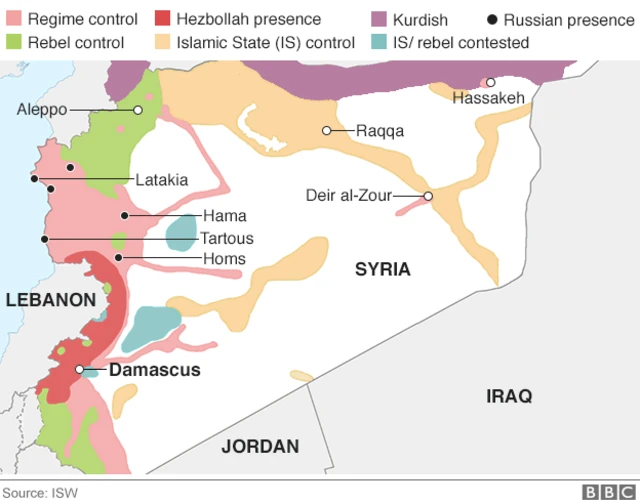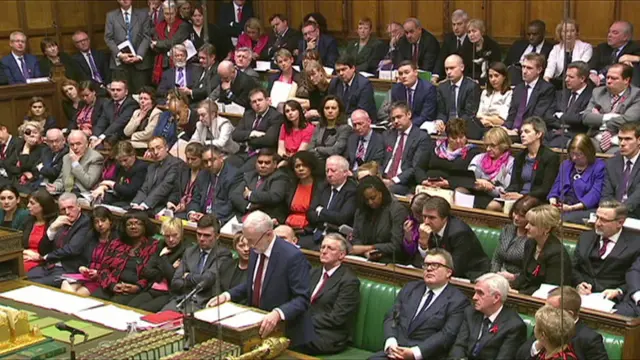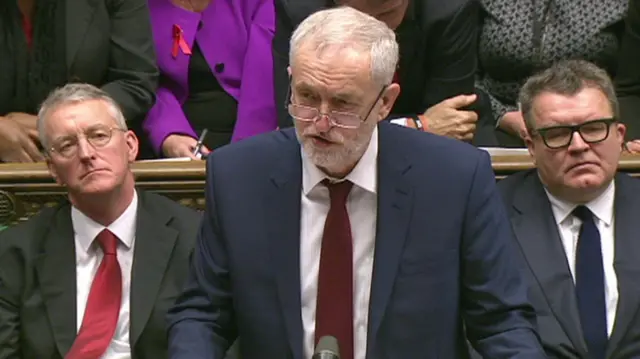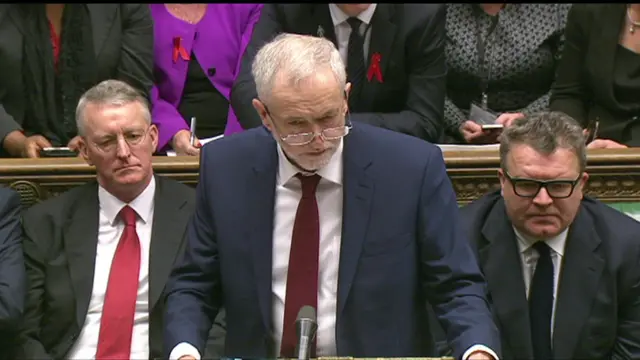Tweet us your views - @BBC_HaveYourSaypublished at 12:52
Kevin Wright
MPs vote by 397 to 223 to authorise UK air strikes against so-called Islamic State in Syria
RAF Tornado jets carry out their first air strikes against IS in Syria, the Ministry of Defence confirms
Four RAF Tornado jets take off from RAF Akrotiri in Cyprus
During a 10-hour debate, David Cameron urged Tory MPs to 'take a stand' against IS
Jeremy Corbyn said the PM's case "does not add up" and could make the situation worse
Despite Tory rebels, PM was helped by votes of some Labour MPs, the Lib Dems and DUP
A separate cross-party amendment opposing airstrikes was defeated by 390 votes to 211
Alex Hunt, Pippa Simm, Chris Davies, Aiden James and Rajdeep Sandhu
Kevin Wright
Francesca Middleton
It is "critically important" for MPs to be honest with the British public about the "potential consequences" of the military action the government is proposing, says Jeremy Corbyn.
He says it will increase the terror threat.
He also raises concerns about an increase in Islamophobic attacks in the UK since the Paris attacks.
And he says more bombing will "kill innocent civilians" and lead to many more Syrian refugees.

Tweet: @BBC_HaveYourSay
@Willnomous
BBC political editor tweets...
Allow X content?
This article contains content provided by X. We ask for your permission before anything is loaded, as they may be using cookies and other technologies. You may want to read X’s cookie policy, external and privacy policy, external before accepting. To view this content choose ‘accept and continue’.
Allow X content?
This article contains content provided by X. We ask for your permission before anything is loaded, as they may be using cookies and other technologies. You may want to read X’s cookie policy, external and privacy policy, external before accepting. To view this content choose ‘accept and continue’.
Labour laeder Jeremy Corbyn claims the extension of the UK's bombing campaign against IS in Iraq to Syria is "mission creep" and claims that Western boots on the ground in Syria "is a real possibility" in the future.

By Frank Gardner, BBC security correspondent
David Cameron’s exact words were:
Quote MessageWe believe there are around 70,000 Syrian opposition fighters - principally the Free Syrian Army – who do not belong to extremist groups...and with whom we can co-ordinate attacks on ISIL."
This was said in the context of the Government’s response to criticism that it does not have a coherent wider strategy for defeating so-called Islamic State (IS) or bringing an end to the Syrian civil war.
Whitehall officials say the source for this 70,000 figure is the JIC, the Joint Intelligence Committee, drawing on assessments by the FCO, UK intelligence agencies and open sources.
Officials say the figure refers to Syrian rebel fighters who fulfil 2 very basic criteria:
1) They renounce terrorism. ie they are not part of IS or Al-Qaida
2) They are "committed to a pluralistic Syria", ie one in which minorities like Christians and Shias would be equal citizens.
Independent experts say the figure of 70,000 is broadly accurate but there is a high degree of scepticism as to how many could actually be persuaded to fight IS instead of the Syrian regime, let alone be moulded into a cohesive, effective force. There are also questions over just how ‘moderate’ and pluralistic many of the Islamist factions are within this number. It is far from certain that, if empowered in a post-Assad, post-IS Syria, battle-hardened Sunni rebels would be happy to share power with Christians and Alawites.
After more than four years of civil war in Syria it is clear that the most highly motivated and effective rebel forces are the Islamists. Non-Islamists rebels feel badly let down by the West which failed to supply them with weapons, or carry out air strikes on the regime after the mass poison gas attack in 2013.
Finally, the idea that even in a post-Assad Syria, rebels who have spent four years fighting his forces will then want to team up with them in a joint effort to defeat IS is not impossible but does require a lot of optimism. The wounds of this war run very deep and while IS is disliked by most Syrians there are many more who hate President Bashar and his regime even more.
All this is, of course, a separate but not entirely unrelated issue to the rights or wrongs of bombing IS leaders and their command centres in Syria, which Whitehall officials say are actively planning attacks on this country. But it does bring into question whether the groundforce part of the wider strategy is actually viable at present.
The Labour leaer goes on to cast doubt on their being "credible" Syrian ground forces to take back the territory from IS. This point concerns the 70,000 figure the government has cited - and which has been contested by sceptical MPs. Mr Corbyn says:
Quote MessageIt's quite clear there are no such forces."

The Leader of the Opposition says there's "no doubt" that IS has imposed "a reign of sectarian human terror" in Iraq, Syria and Libya, nor that it poses a threat to the UK. But will UK bombing reduce or increase that threat to Britain, and will it counter or spread the terror, he asks.
He says the PM has been "unable to explain" why air strikes will make a "significant" military impact on the existing coalition campaign against IS in Syria.
Public opinion is "moving increasingly against" an "ill-thought rush to war", says Jeremy Corybn. He says he is proposing that Labour does not support the government's motion on air strikes today (although his MPs have been given a free vote) and he appeals to all MPs to follow suit. His shadow foreign secretary Hilary Benn - who supports military action in Syria - looks on from the Labour bench, to Mr Corbyn's left.
"Terrorist sympathiser" was the top UK Twitter trend on Wednesday morning, driven by opponents of the bombing, many of whom were using the tag ironically to describe themselves and to criticise the prime minister.
Sanjay Khetani
Josephine Humphrey
For those who do not support the bombing of terrorist training camps, Daesh leaders, communication hubs, what would they propose in the alternative? Negotiation with Daesh does not seem an option. Lots of comments on why not, but less suggestions on what would be an alternative which would work to protect the UK.
Allow X content?
This article contains content provided by X. We ask for your permission before anything is loaded, as they may be using cookies and other technologies. You may want to read X’s cookie policy, external and privacy policy, external before accepting. To view this content choose ‘accept and continue’.
Following that point, Labour MP John Mann rises to condemn attacks within the Labour Party on its MPs who intend to back the government's motion. Jeremy Corbyn agrees that is not acceptable.

Labour leader Jeremy Corbyn begins by saying the government's motion authorising military against IS in Syria has potentially "far reaching consequences" for Britain, Syria and the wider Middle East. He says it's a big vote for MPs to take.
Quote MessageIt must be treated with the utmost seriousness and respect given to those who make a different judgement about the right course of action to take. Which is why the prime minister's remarks about terrorist sympathisers both demeans the office of the prime minister and, I believe, undermines the seriousness of the deliberations we're having today."
He invites the PM to apologise. The PM remains seated on the government front bench.
"Since he's unmoved", remarks Mr Corbyn, "we'll have to move on with the debate".
"Inaction does not amount to a strategy for our security or the Syrian people's," says David Cameron who says he does not believe it's the right option - as he makes his final appeal for MPs to back the government's motion. He pays tribute to Britain's Armed Forces as he concludes his remarks.